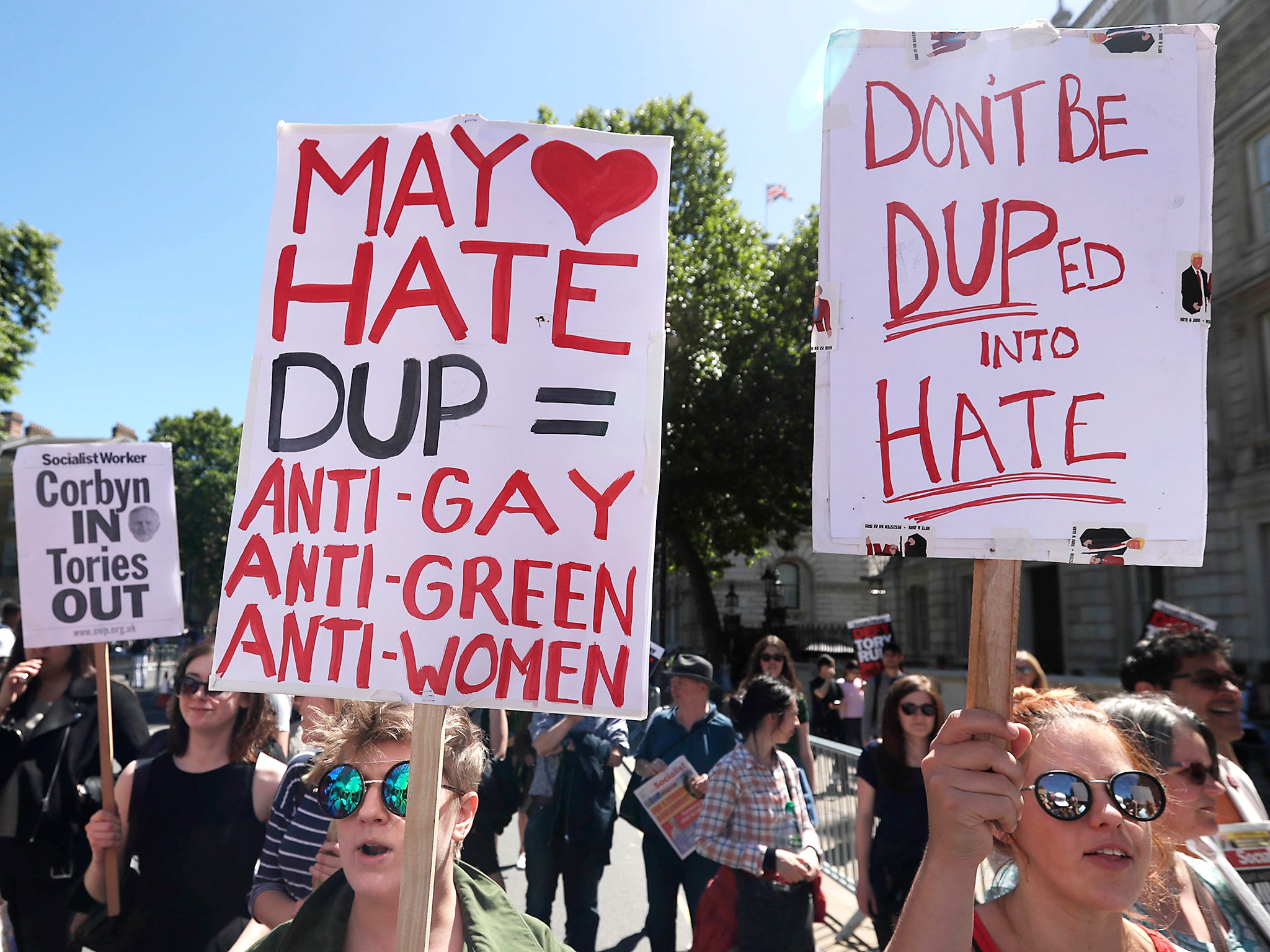Theresa May must stand up for gay rights, reproductive rights and liberal values
We mean no disrespect to the voters of Northern Ireland when we point out that most of the population of the United Kingdom have reservations about some of the policies of the Democratic Unionist Party

Your support helps us to tell the story
From reproductive rights to climate change to Big Tech, The Independent is on the ground when the story is developing. Whether it's investigating the financials of Elon Musk's pro-Trump PAC or producing our latest documentary, 'The A Word', which shines a light on the American women fighting for reproductive rights, we know how important it is to parse out the facts from the messaging.
At such a critical moment in US history, we need reporters on the ground. Your donation allows us to keep sending journalists to speak to both sides of the story.
The Independent is trusted by Americans across the entire political spectrum. And unlike many other quality news outlets, we choose not to lock Americans out of our reporting and analysis with paywalls. We believe quality journalism should be available to everyone, paid for by those who can afford it.
Your support makes all the difference.The last time this country had a hung parliament, David Cameron and Nick Clegg made brave decisions that, somewhat surprisingly, delivered “strong and stable” government for five years. We should not be fooled into thinking that this hung parliament is comparable. This time, the 1970s offer a better, and less auspicious, precedent.
We mean no disrespect to the voters of Northern Ireland when we point out that most of the population of the United Kingdom have reservations about some of the policies of the Democratic Unionist Party.
We can accept the logic of support for Brexit providing the glue that would keep a deal together between the Conservatives and the DUP. Although it should be pointed out that in Northern Ireland the majority voted to remain in the EU, and that the DUP is just as opposed to the imposition of a hard border between the North and the Republic as any other party. How Northern Ireland can leave the EU and keep an open border with the EU is one of those “you should have thought of that earlier” questions.
However, it seems that Theresa May has in mind something more than an arm’s-length deal intended to protect her Government’s business in the House of Commons. She has sent Gavin Williamson, her Chief Whip, to Belfast to try to negotiate a full coalition, including, as we report today, a seat or seats for the DUP at the Cabinet table.
This reflects the weakness of her position after losing her majority. The DUP is the only party to which she can turn. The Liberal Democrats oppose Brexit, commendably. They thought they could secure some of their policies in 2010 – and indeed they did secure significant gains for liberalism and social justice – but now the gulf between them and Ms May is too wide. The only other party that could deliver a Conservative government, the Scottish National Party, has made its implacable opposition to Ms May’s party well known.
The DUP knows what a strong position it is in. Its leaders remember how unionist parties used their leverage in the dying days of John Major’s government (which lost its majority through deaths and by-elections in December 1996) and – more significantly – after the breakdown of the Lib-Lab pact in 1978. James Callaghan’s minority Labour government needed unionist votes to survive. It was a complete coincidence, of course, that the number of Northern Ireland seats was subsequently increased from 12 to 17.
This is a test, then, of Ms May’s integrity. If she deals with the DUP, she must do so without compromising her Government’s support for gay rights, reproductive rights and liberal values. She must stand by the assurances she gave to Ruth Davidson, the leader of the Scottish Conservatives on Friday. “I was fairly straightforward with her and I told her that there were a number of things that count to me more than party. One of them is country, one of the others is LGBTI rights,” Ms Davidson said. She said that Ms May agreed to try to use her influence to advance LGBTI rights in Northern Ireland.
At that stage, however, Ms Davidson was under the impression that “the Prime Minister has already made it clear that it is not going to be a formal coalition”. Ms May’s position as Prime Minister is already precarious enough. If she fails to stand up for equal rights, reproductive rights and liberal values, she will find it unsustainable.
Join our commenting forum
Join thought-provoking conversations, follow other Independent readers and see their replies
Comments